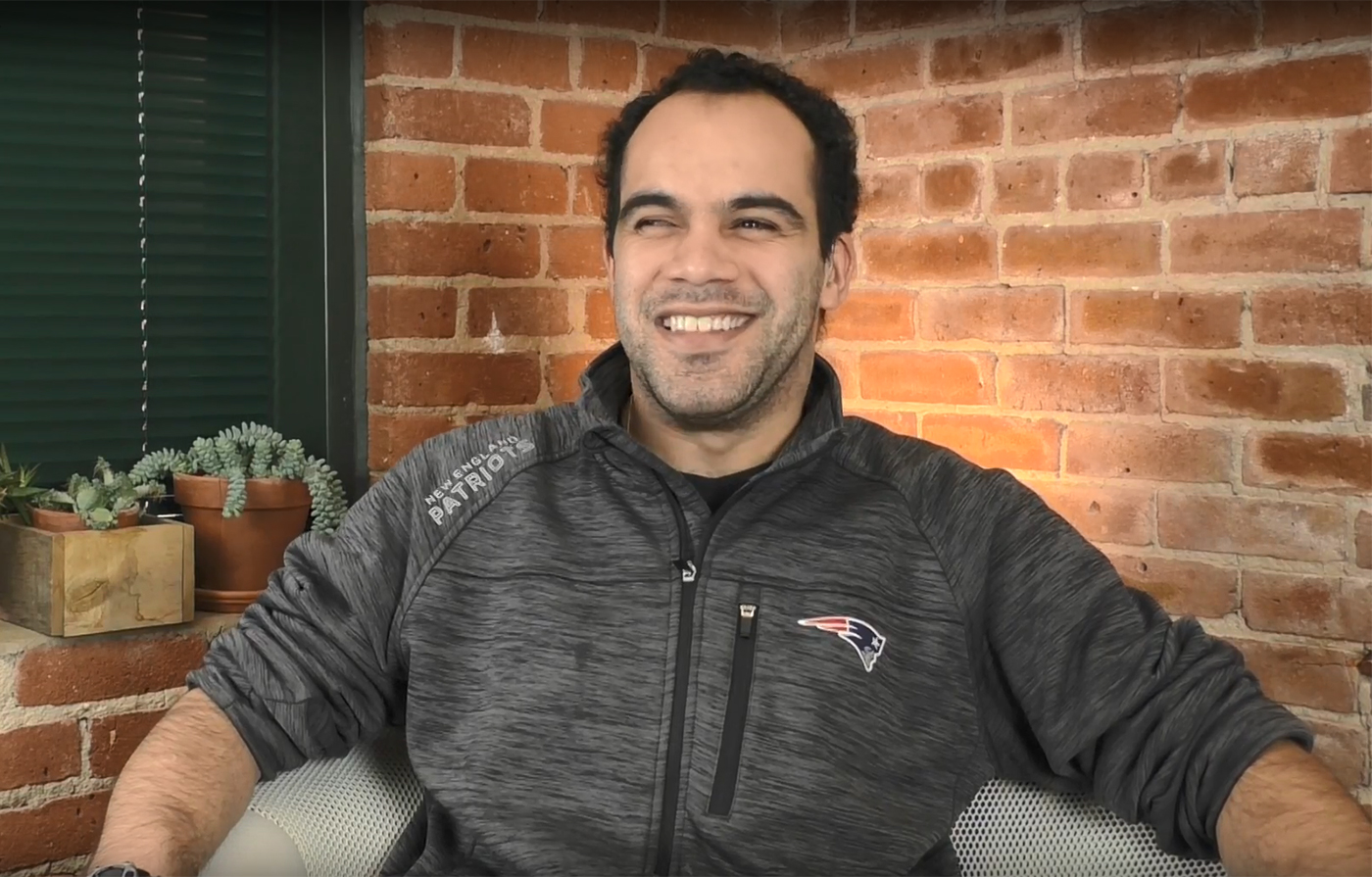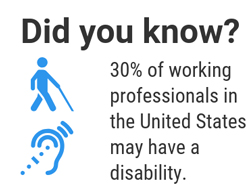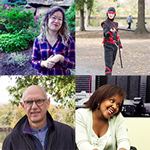Faces Behind the Screen: Alex
Quick Links
Alex Reddy started teaching CPR training for the Red Cross after leaving his job as a corrections officer in the Federal Bureau of Prisons in Berlin, New Hampshire.
“I just wanted to be someone who was fair, somebody who tried to be kind to people. And sometimes that’s not always the best kind of personality to have if you work in a prison,” he said.
Growing up, Alex’s parents encouraged him to properly equip himself as a deaf individual who was self-reliant and could adapt to any situation. Similarly, as a CPR trainer, he finds joy in helping others learn self-reliance by developing the skills to address emergencies like cardiac arrest.
Still, as someone with hearing loss, Alex recognizes the importance of accessibility — making the world an equal and inclusive space for everyone, including those with disabilities — and why that concept is so important in the design of emerging technologies.
How long were you working in corrections? What was it like?
ALEX: I worked in corrections for about a year. And essentially my responsibility was working as a correctional officer.
I did the regular cell searches. I did rounds. I did breathalyzers. I did perimeter patrol. It was interesting. It was definitely a different lifestyle, you know. My eyes were opened wide.
If I’m not wearing my hearing aids, I consider myself “little d.” If I am wearing my hearing aids, I consider myself hard of hearing. I don’t know if that’s allowed. Like, I don’t know if I have to be one or the other.
It was very different from what I expected it to be. Sometimes people think that prison can be like “Beyond Scared Straight,” the TV show [where] people get scared, and people get angry, and people shout, and you know, it’s all interesting. And then when you actually get inside the prison, it’s actually kind of boring, depending on where you are.
So, how did you get into CPR training?
ALEX: I got involved with CPR training through the Red Cross.
After working in corrections, I came back to Massachusetts deciding to pursue graduate education. And there was this opportunity to work at the Red Cross part-time, and I said, hey, why not give it a shot and see what happens.
And next thing I know, I couldn’t leave because I enjoyed it so much; teaching people how to save lives and teaching them psychomotor skills and knowledge that are really applicable to their daily lives.
You never know what can happen in your life and when something like cardiac arrest happens, you want to make sure you’re ready to go. You want to make sure you’re prepared. And I really believe in the training. I really believe in the mission of the organization, and I love it. It’s been amazing.
Do you identify more as deaf or hard of hearing?
ALEX: I know there are different types of deaf, like by the “big D” and “little d” right? So, I believe I’m two different types of deaf.
I believe that I’m deaf with a “little d.” I actually do have profound deafness. It’s one of those things where I’ve had that my entire life — I have, like, 95% in my left and 98% in my right profound deafness.
You have to learn to adapt and overcome.
But then I also believe that I’m hard of hearing because I wear hearing aids, and I can communicate. It really depends on the circumstances. If I’m not wearing my hearing aids, I consider myself “little d.” If I am wearing my hearing aids, I consider myself hard of hearing. I don’t know if that’s allowed. Like, I don’t know if I have to be one or the other.
It doesn’t really matter, as long as you are comfortable with your own identity, I guess?
ALEX: Honestly, I never even thought really twice about being deaf. You know, it’s just something where I grew up with it for so long, I sometimes forget to tell people that I am deaf.
It’s been just an extraordinary adventure with my deafness in the sense that I love it. There are situations where it’s very beneficial, and there are other situations where it’s not.
If it was easy, I would make closed captioning available on everything, just so the option was always there.
Honestly, I don’t know how many people would say this, but I would not trade it for anything in the world, just because it is a part of me. It’s something that I’ve always, I think, been blessed with, to be able to share with others [who are] overcoming hardships and to be thankful for what you have in your life. It’s so easy to take something for granted, and then you realize that having a disability really makes you humble because it’s always there.
Are accommodations like video captions available for you at work if you need it?
ALEX: I guess when it comes to closed captioning and certain accommodations, I can think of a couple times I have [needed it]. I personally don’t request it very often. And, I mean, I probably should.
Growing up, my mother and my parents, they’ve always challenged me to be better; to not have an easy life and say, “well, I’m OK with just asking for closed captioning every single time,” because sometimes it may not be available. You have to learn to adapt and overcome.
It’s always been a challenge for closed captions in the sense that it’s always available on TV. But sometimes it’s not always available in the workplace, so I just have to do the best I can with what I have.
I do let people know that I’m deaf. And I do ask them to speak clearly, speak slowly, try to enunciate their words, and make sure I’m facing them. I can see their lips because I’m a lip reader. I’m not afraid to say those things. It’s just something that I honestly haven’t really thought about a lot because I hear very well with my hearing aids. But, captioning is something that I think should be implemented, definitely, for those who need it.
Would it be easier if everything just had closed captions in the first place?
ALEX: Oh, yeah, definitely, it would be easier. Of course, no doubt in my mind, of course, it would be easier. I mean, you know, you’ve got captions on? It’s great. You read the captions.
[…] If it was easy, I would make closed captioning available on everything, just so the option was always there.
There are some times when my parents like to watch TV without the captions. And every now and then, I might say, oh, could we watch it with closed captions, yes or no? And they’d be like, oh yeah, of course. And we’d pop it on.
But imagine if I didn’t have that option. Then I would have to do what my mom told me. She always told me you have to be bigger, faster, stronger than the next person beside you because you want to make sure that you can be successful in life. And so I would find a way. [CHUCKLES]
If you run into videos where you don’t see captions, do you feel excluded?
ALEX: Oh, like YouTube? Oh my goodness. YouTube is horrendous with their closed captions because they tend to be autogenerated.
One of the things that drive me crazy is I’ll go watch something on YouTube, and sometimes I’ll click on the option. I’d like to hear what people have to say, especially, you know, like a TED Talk. Sometimes you go to watch one of those videos and you’ve got that closed captioning option. So you click on it. You’re hoping, and it doesn’t show up.
My appearance gives the impression that I’m not legally deaf, and a lot of people can’t see my hearing aids because it’s covered by my hair.
So, one of the things I usually do is I try to turn up the volume. And that doesn’t always help because just because a frequency gets louder doesn’t necessarily mean that I’ll be able to understand it better. So, that’s really the biggest issue with my hearing is that I can hear everything, but I can’t always distinguish what’s actually coming from that noise.
What are some things that a hearing person wouldn’t expect to be a problem that you might run into a lot?
ALEX: I think one of the things that I sometimes run into a lot is when I just go to talk to people in general. My appearance gives the impression that I’m not legally deaf, and a lot of people can’t see my hearing aids because it’s covered by my hair.
If it’s in a really crowded place, if we’re talking about something really important and I can’t hear them, I have to stop them mid-sentence. And I’ll be like, I’m so sorry, but I can’t hear you very well. I’m legally deaf.
Have you ever been denied an accommodation?
ALEX: I was in elementary school. It was a private school and they had a small budget. And basically, they were not prepared to handle the special educational needs that I needed.
Quite frankly, they fought us every step of the way. They didn’t want to do IEPs (individualized education programs) every semester. They only wanted to do it once a year.
They also didn’t want to pay for a deaf educator to come to the classroom. And that was something that I desperately needed. I needed to have somebody who was able to translate what was going on and to be able to help me because there was only one teacher in the classroom. And then another thing that they also didn’t want to help me with was my FM system, which was really crucial to my education because I had an FM system from, I would say, third or fourth grade all the way up to high school.
I believe it’s important for those companies to continue to stay in touch because behavior always changes alongside technology.
The public school system in my town, however, they decided to provide all those services for me because they knew that eventually, I would be going to the public school system. They bought an FM system for me. And they paid for a deaf educator twice a week to come see me, Monday and Friday, so she could check in and help me with whatever I needed. And they also made sure that if I needed any services, any IEP meetings, they’d take care of that for me, too.
What would you like tech companies to keep in mind?
ALEX: Probably the only thing I would like them to know is, if the deaf community is important to them, continue to be active and involved with the deaf community.
It’s very easy to be involved for a short period of time for, say, for instance, a project. They achieved the objective of the project. But they don’t maintain those connections that they’ve made.
I believe it’s important for those companies to continue to stay in touch because behavior always changes alongside technology. You know, I’m a ’90s person, and so I grew up with CD players, cassette players, and all of this stuff. And now we have all this new technology that we have to get used to. Our behavior changes with that technology.
If we can benefit the deaf community, then we can also benefit technology companies and how they make their products available for everyone.
Faces Behind the Screen is a storytelling project focusing on communities that benefit from a more accessible web.








